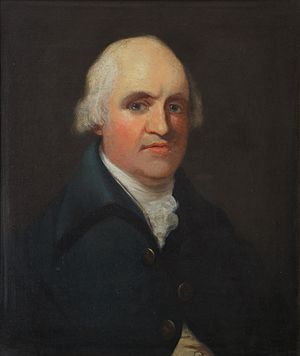James Pettit Andrews facts for kids
Quick facts for kids
James Pettit Andrews
|
|
|---|---|

James Pettit Andrews, portrait from the 1790s by Samuel Drummond
|
|
| Born | 1737 |
| Died | 6 August 1797 |
| Known for | historian, antiquary |
|
Notable work
|
History of Great Britain connected with the Chronology of Europe from Caesar's Invasion to Accession of Edward VI |
James Pettit Andrews (born 1737, died 1797) was an English historian. He was also an antiquary, which means he studied old things and history.
Contents
About James Andrews
James Pettit Andrews was born in 1737. His family lived near Newbury in Berkshire, England. His older brother was Sir Joseph Andrews.
Early Life and Career
James was taught at home. Later, he became a magistrate, which is like a judge, in London. He worked there from 1792 until he died.
In 1763, James Andrews built a large house called Donnington Grove. It was designed in a special style called Strawberry Hill Gothic. He sold this house in 1783. He also helped a group called the Committee for the Relief of the Black Poor in the 1780s. This group worked to help poor Black people in London.
Andrews passed away in Brompton in 1797. He was buried in Hampstead Church.
His Writings
James Andrews wrote several important books. He was known for his detailed historical works.
Major History Books
His main work was a book called History of Great Britain connected with the Chronology of Europe. It covered history from when the Romans invaded Britain up to the time of King Edward VI. This book was published in two parts between 1794 and 1795.
In this history book, he showed England's story on one page. On the page next to it, he showed what was happening in Europe at the same time. This made it easy to see how events were connected.
He also wrote a book that continued another historian's work. It was called History of Great Britain from Death of Henry VIII to Accession of James VI of Scotland. This book was published in 1796.
Other Works and Translations
Andrews also translated a German play into English. It was called The Inquisitor and was published in 1798. He worked on this with Henry James Pye.
Another book he wrote was The Savages of Europe in 1764. This was a satire, which means it used humor to criticize English society. He translated it from a French book. He also put together a collection of interesting stories and gossip called Anecdotes Ancient and Modern in 1789.
His Family Life
James Andrews married Anne Penrose. She was the daughter of Thomas Penrose, a church leader in Newbury. Anne's brother, Thomas Penrose, was a poet. James Andrews helped to publish a collection of his brother-in-law's poems in 1781.
 | Mary Eliza Mahoney |
 | Susie King Taylor |
 | Ida Gray |
 | Eliza Ann Grier |

